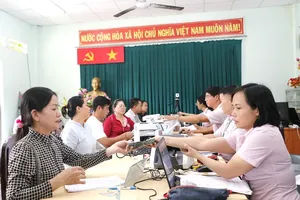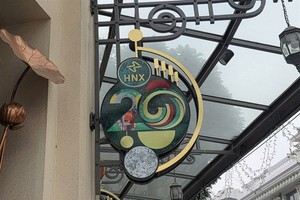Cautious moves into crypto
According to industry insiders, several companies are eager to participate in setting up crypto asset exchanges but remain cautious, given that the field is still entirely new to Vietnam’s financial market.
As of early October, nine companies specializing in crypto assets had been registered, including SSI Digital JSC (SSID) and three firms indirectly linked to Techcombank, VPBank, and HDBank, said a representative of Viet Dragon Securities (VDSC).
Meanwhile, Military Bank (MB) has signaled its intention to enter the market by signing a memorandum of understanding (MoU) with South Korea’s Dunamu—the operator of Upbit Exchange—to receive technology transfer and support in establishing a crypto trading platform.

Associate Professor Dr. Nguyen Huu Huan, a member of the advisory team for establishing the International Financial Center in HCMC, noted that the licensing conditions are highly stringent. For instance, a crypto asset exchange must have a minimum charter capital of VND10 trillion (approx. US$400 million), and crypto assets can only be offered and issued to foreign investors.
“With such requirements, enterprises need thorough preparation before submitting applications. It is likely that Vietnam will not have its first licensed crypto exchange until after 2026,” he projected.
According to Mr. Le Bao Nguyen, Deputy General Director of SSID, the company has completed its technological infrastructure, staffing, and governance model, ready to participate in the digital asset market.
“We don’t just aim to operate a trading platform, but to build a comprehensive digital asset ecosystem—from core technology and blockchain talent development to international collaboration and support for Web3 startups. Our goal is to help lay the foundation for a transparent and interconnected market between Vietnam and the region,” Mr. Le Bao Nguyen said.
He also proposed a more flexible approach during the initial phase, recommending a “controlled sandbox” model that allows enterprises to operate on a small scale under supervision and periodic evaluation. This, he said, would enable regulators to collect real-world data while allowing businesses to refine their models before large-scale licensing.
MB Bank, though partnering with a South Korean firm, is also proceeding cautiously. A bank representative highlighted several risks, including ultra-high trading volumes, constant transaction flows, and the need for specially designed systems capable of handling billions of transactions daily. The bank must also comply with strict anti-money laundering (AML) regulations—from customer identification to transaction monitoring.
Moreover, MB faces resource challenges, as crypto assets remain a relatively unfamiliar domain for both the bank and the broader Vietnamese banking sector. Legal uncertainties also pose risks, as the regulatory framework will continue to evolve throughout the pilot phase, while banks are still developing their understanding of international best practices in digital asset management.
Be cautious to avoid risk
A key provision of Resolution No.05—restricting the sale and issuance of crypto assets to foreign investors—has drawn significant attention. Economists have suggested expanding eligibility to include domestic professional investors.
However, at a recent forum on crypto assets, Mr. To Tran Hoa, Deputy Head of Market Development at the State Securities Commission, emphasized that investor protection and risk control remain top priorities. “The financial literacy of Vietnamese investors is still limited, and there have been numerous crypto-related scams. Funds can be transferred instantly, making recovery or compensation nearly impossible. Therefore, any market opening must be accompanied by effective oversight and enforcement mechanisms,” he stated.
“In the initial stage, Vietnam will limit offerings to foreign investors to attract international capital while allowing time to refine legal frameworks and enhance public awareness. The market’s real appeal lies not in how quickly it opens, but in the quality, liquidity, transparency, and safety of its products and services,” Mr. To Tran Hoa stressed.
Financial expert Nguyen Tri Hieu echoed these concerns, warning that the crypto market could easily become a haven for financial crimes. “Instead of wiring money through banks, one could simply buy Bitcoin or other tokens and transfer them abroad,” he said. He proposed that all crypto transactions be routed through banks, making them mandatory checkpoints to prevent money laundering and ensure transparency in capital flows.
Economists agree that the establishment of one or more licensed crypto exchanges in Vietnam would significantly enhance investor protection and market transparency. Having legally recognized platforms with domestic headquarters and regulatory oversight would allow for more efficient identity verification, fund tracing, and investigations into suspicious activities—advantages foreign-based exchanges cannot offer.
Mr. Tran Huyen Dinh, Chairman of the Fintech Application Committee under the Vietnam Blockchain and Digital Asset Association, noted that international exchanges currently have a competitive edge thanks to their fast transaction speeds, diverse product offerings, and high liquidity.
“To attract investors to Vietnam-based exchanges once licensed, local platforms must match global standards in technology, transparency, and cybersecurity while ensuring a seamless user experience,” Mr. Tran Huyen Dinh advised. “Selecting suitable, liquid products to list will also be crucial to drawing investor participation.”
























